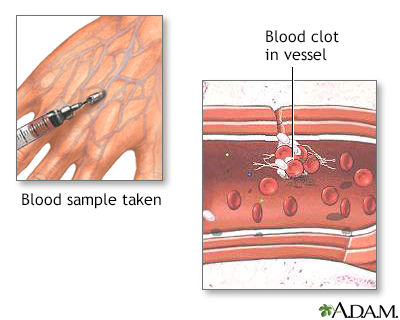Factor V deficiency
Parahemophilia; Owren disease; Bleeding disorder - factor V deficiency
Factor V deficiency is a bleeding disorder that is passed down through families. It affects the ability of the blood to clot.
Images


Causes
When you bleed, a series of reactions take place in the body that helps blood clots form. This process is called the coagulation cascade. It involves as many as 20 different special proteins called coagulation, or clotting, factors. You may have a higher chance of excess bleeding if one or more of these factors are missing or are not functioning like they should.
Factor V deficiency is caused by a lack of factor V. When certain blood clotting factors are low or missing, your blood does not clot properly.
Factor V deficiency is rare. It may be caused by:
- A variant factor V gene passed down through families (inherited)
- An antibody that interferes with normal factor V function
You can develop an antibody that interferes with factor V:
- After giving birth
- After being treated with a certain type of fibrin glue
- After surgery
- With autoimmune diseases and certain cancers
Sometimes the cause is unknown.
The disease is similar to hemophilia, except bleeding into joints is less common. In the inherited form of factor V deficiency, a family history of a bleeding disorder is a risk factor.
Symptoms
Excessive bleeding with menstrual periods and after childbirth often occurs. Other symptoms can include:
- Bleeding into the skin
- Bleeding of the gums
- Excessive bruising
- Nosebleeds
- Prolonged or excessive loss of blood with surgery or trauma
- Umbilical stump bleeding
Exams and Tests
Tests to detect factor V deficiency include:
- Factor V assay
- Blood clotting tests, including partial thromboplastin time (PTT) and prothrombin time (PT)
- Bleeding time
Treatment
You will be given fresh blood plasma or fresh frozen plasma infusions during a bleeding episode or after surgery. These treatments will correct the deficiency temporarily.
Outlook (Prognosis)
The outlook is good with diagnosis and proper treatment.
Possible Complications
Severe bleeding (hemorrhage) could occur.
When to Contact a Medical Professional
Go to the emergency room or call 911 or the local emergency number if you have an unexplained or prolonged loss of blood.
Related Information
Protein in dietHemophilia
Bleeding disorders
References
Gailani D, Benjamin FT, Wheeler AP. Rare coagulation factor deficiencies. In: Hoffman R, Benz EJ, Silberstein LE, et al, eds. Hematology: Basic Principles and Practice. 8th ed. Philadelphia, PA: Elsevier; 2023:chap 135.
Ragni MV. Coagulation factor deficiencies. In: Goldman L, Cooney KA, eds. Goldman-Cecil Medicine. 27th ed. Philadelphia, PA: Elsevier; 2024:chap 160.
Samelson-Jones BJ, Branchford BR, Flood VH. Hereditary clotting factor deficiencies (bleeding disorders). In: Kliegman RM, St. Geme JW, Blum NJ, et al, eds. Nelson Textbook of Pediatrics. 22nd ed. Philadelphia, PA: Elsevier; 2025:chap 525.
BACK TO TOPReview Date: 3/31/2024
Reviewed By: Todd Gersten, MD, Hematology/Oncology, Florida Cancer Specialists & Research Institute, Wellington, FL. Review provided by VeriMed Healthcare Network. Also reviewed by David C. Dugdale, MD, Medical Director, Brenda Conaway, Editorial Director, and the A.D.A.M. Editorial team.

Health Content Provider
06/01/2025
|
A.D.A.M., Inc. is accredited by URAC, for Health Content Provider (www.urac.org). URAC's accreditation program is an independent audit to verify that A.D.A.M. follows rigorous standards of quality and accountability. A.D.A.M. is among the first to achieve this important distinction for online health information and services. Learn more about A.D.A.M.'s editorial policy, editorial process and privacy policy. A.D.A.M. is also a founding member of Hi-Ethics. This site complied with the HONcode standard for trustworthy health information from 1995 to 2022, after which HON (Health On the Net, a not-for-profit organization that promoted transparent and reliable health information online) was discontinued. |
The information provided herein should not be used during any medical emergency or for the diagnosis or treatment of any medical condition. A licensed medical professional should be consulted for diagnosis and treatment of any and all medical conditions. Links to other sites are provided for information only -- they do not constitute endorsements of those other sites. © 1997- 2024 A.D.A.M., a business unit of Ebix, Inc. Any duplication or distribution of the information contained herein is strictly prohibited.
